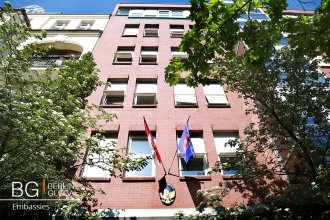 |
The Embassy of Indonesia in Berlin |
Contact

Address: Lehrter Strasse 16-17, 10557 Berlin, Germany
Tel.: +49-30-47807-200
Fax: +49-30-44737-142
E-mail: info@kbri-berlin.de
The Ambassador
Amb. Arif Havas Oegroseno

Career
Deputy of Maritime Sovereignty of the Coordinating Ministry of Maritime Affairs of the Republic of Indonesia (2015-present)
Ambassador of the Extraordinary and Plenipotentiary (LBBP) of the Republic of Indonesia to Belgium, Luxembourg and the European Union (2010-2015);
Director General of International Law and Agreement of the Ministry of Foreign Affairs of the Year (2007–2010)
Director of the Polkamwil Agreement of the Ministry of Foreign Affairs of the Republic of Indonesia (2003–2007)
In addition to these positions Havas also held positions - non career positions including:
President of the State Conference of the United Nations International Law on the Sea Convention 2010-2011;
Chief Negotiator of the Border Agreement, Extradition Agreement, MLA Agreement, RI - Australia Security Agreement, Manado World Ocean Conference Resolution;
Chairperson of the Delegation of the Republic of Indonesia Submission of Extension of the Continental Platform of the Republic of Indonesia to the United Nations in 2007-2010
Education
Harvard Law School (1991–1992)
Harvard Institute for International Development (1990)
Faculty of Law, Diponegoro University (Graduated in 1986)
History
In recent years, German-Indonesian relations have become closer, as the largest members of the European Union and the Association of Southeast Asian Nations (ASEAN), these countries usually take similar positions on many issues relating to the development of regional organizations. In the last years, there have been regular high-level visits from both sides, as well as important international trade fairs where Indonesia was a partner, like the ITB in Berlin in March 2013, and the BAUMA in Munich in April 2013, which gave a considerable boost to economic relations. Germany supports the Indonesian government’s ongoing reform efforts with a wide range of projects designed to ensure good governance and strengthen administrative structures.
There are currently around 300 German companies operating in Indonesia. They include global players, as well as small and medium-sized companies covering a big section of German business. The German-Indonesian Chamber of Industry and Commerce (EKONID, a member of the German Chamber Network) promotes bilateral trade and investment between Indonesia and Germany, by offering consulting on market development. The range of German exportations to Indonesia has been increasing. In 2015, it went up by 15% (3,5 billion dollars), compared to 2014. Germany is Indonesia's 9th biggest supplier of goods.
Concerning Development Cooperation, the German-Indonesian relations began in the 1950s, with Germany being Indonesia’s fourth largest bilateral development cooperation partner, especially in the areas of Energy and Climate Change; Sustainable Economic Development for Pro-Poor Growth; and Good Governance and Global Networks. Concerning the cultural and education bond, it is a very old and strong one. It started back when several Germans were living in the former Dutch India, and had one high point in the 19th century, influencing Germany’s literary and art scene. One example is the influence of the Indonesian painter Raden Saleh (1807-1880) on Dresden’s Late Romanticism. This bond still exists today, for example through the Goethe Institute, which has offices in Jakarta, Bandung and Surabaya. Nowadays, more than 150,000 Indonesians are learning German, while it's known that, after Indonesia gained independence, 30,000 Indonesians moved to the Federal Republic of Germany to study.
Concerning religious issues, there is a German-Indonesian Interfaith and Intercultural Dialogue where representatives from both countries' government, and several civil-society organisations, and religious communities meet to keep up a dialogue on the subject.



